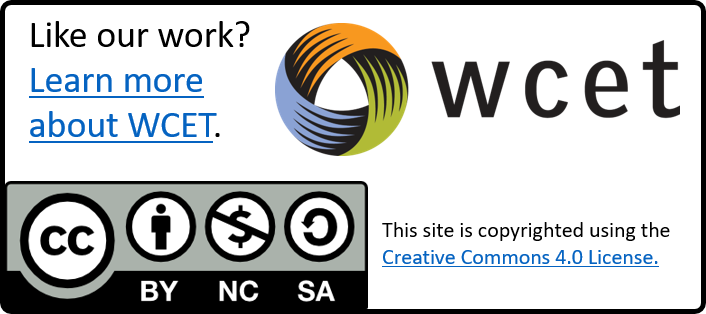WCET “What’s Next”: best practices, next steps, and lessons learned.
|
Institutional Sources
|
|
Face-to-face to “remote learning” course conversion on steroids.
|
| Over spring break, the University moved nearly 5,000 face-to-face course sections, over 700 blended course sections, and 500,000 course credit hours to digital delivery. Fortunately, UCF has a very robust level of digital learning infrastructure, and faculty and student support services, to support this change. |
The UCF Story
|
|
Triage faculty development at scale.
|
| Daily, live training sessions, with learning outcomes related to D2L basics, creating tests and quizzes in the LMS, using BlackBoard Collaborate, and Respondus began mid-March and were sustained for 2+ weeks. Approximately 1,200 faculty participated in these offerings. Many of these faculty are learning these tools and tips for the first time and others are enhancing their skills. |
The Wichita State Story |
|
“Remote learning” is not online learning. It is time to add structure to the “wild west.”
|
| Going forward, BC Remote Learning Courses must be delivered using the College’s Desire2Learn (D2L) learning management system, Blackboard Collaborate, and other approved Broward College systems. Remote courses blend both synchronous (at least 21%) and asynchronous components to meet the course’s learning outcomes. Goals include requiring that all faculty teaching remote classes to satisfactorily complete training. |
The Broward College Story |
| All previous F2F learning will be online for Summer, either using a retrofitted quality online course in D2L, or live online using Zoom with some form of faculty-student communication. Faculty not inclined to go the retrofitted online route (adopting an existing online course) are given the option to deliver their previously on-campus courses using Zoom. |
The St. Petersburg College Story
|
Moving past the emergency deployment phase, the Virtual Campus team is working with academic deans, who will assign faculty new to online learning to one of three options for summer term course delivery. Virtual campus staff will provide faculty development and support for faculty in each pathway:
- “Master Course” — QM certified online courses will be shared with faculty new to online learning.
- “Internet Course” with two categories:
- ‘Legacy internet course’ — These courses, typically electives, have been previously developed and taught but have not gone through the Quality Matters design process to achieve Master Course certification.
- ‘New online course’ – Faculty teaching these courses will be given an enhanced course shell based on the master course template.
- “Remote Learning” Course — Faculty will use Blackboard Collaborate for real-time lecture delivery.
|
Indian River State College Story
|
|
Priority for conversion to certified high quality online courses.
|
| The VA Community College System’s Office of the Teaching & Learning Technologies is converting “Passport” Transfer Courses for summer delivery. Virginia’s Passport “is a 16-credit hour community college program in which all courses are transferable and shall satisfy a lower-division general education requirement at any public institution of higher education.” |
The Virginia CC Story
|
| Leveraging the strength of a collaborative approach to the use of university resources, the University of Nebraska Online is allocating grants to enable the strategic and coordinated conversion of on-campus or blended courses to high quality online, and to scale instructional design and digital tools. Campus leadership is submitting proposals to use a portion of funds available to create online versions of high enrollment ‘gateway/bottleneck’ courses, and core undergraduate and graduate courses that have never been taught online. Already approved for funding to enable summer-term delivery are more than 100 online courses. Over $375,000 is being invested. |
The Univ of Nebraska Story
|
|
Faculty development is a critically important element of initial deployment and continuous improvement of remote learning courses.
|
| Faculty needed to know what software to download and what buttons to push. That was unfortunate by highly necessary step. Moving forward that focus will flip as the future development will begin with the goal of achieving best practices and then focusing on the tools that can be used to accomplish that goal. |
The Virginia CC Story
|
| Professional development used to prepare adjunct faculty and graduate assistants to “inherit” previously prepared versions of an online course will be extended to additional faculty new to teaching remotely, assuming there is already a developed online course for them to inherit. Sessions on teaching with lecture capture using Zoom will be required for all summer term remote instruction faculty, with over 200 faculty already signed up. Tom feels that the University will be much better prepared for summer term. |
The UCF Story
|
| All faculty teaching remotely are expected to complete the College’s introductory “teaching online” professional development course in the coming weeks. The College has not decided on delivery format for fall term courses. |
The St. Petersburg College Story
|
| The Global Campus, which is one of four pillars of WSU’s Academic Outreach and Innovation, is planning to award a certificate to faculty successfully completing ongoing virtual training on topics such as how to better connect with students, and to authentically assess their learning online. |
The WA State Univ Story
|
|
Faculty new to remote learning must have lots of support and nurturing.
|
| Training and support are reinforced with a campus-wide network of volunteer peer faculty mentors, each an alumnus of a faculty fellows’ program, whose members have completed advanced professional developed on methods and standards for online instruction. |
The Wichita State Story
|
| Faculty are being connected with “superusers” in their department who are willing to share their digital content. |
The St. Petersburg College Story
|
| The Global Campus production team, which in normal times rolls online courses over from term to term, is helping faculty utilize Global Campus course shells to facilitate online delivery for campus courses. |
The WA State Univ Story
|
| IRSC used analytics to inform support priorities available for faculty. While all course sections have a BlackBoard shell, Kendall’s team identified 45 faculty who taught face-to-face classes and who had minimal experience with the LMS. A list of sections, course IDs and faculty members was shared with instructional deans, who encouraged these faculty to participate in professional development to prepare them to deliver their course via remote learning. |
Indian River State College Story
|
|
Institutions must sustain delivery of services, support and information to students that can no longer obtain these services on campus.
|
| The university supports a “one-stop” student services center for all students, online and on-campus, whose front-line staff addresses 80% of student requests and questions related to student services (admissions, advising, etc.). The remaining 20% are handed off to individual offices for support; these requests are more complicated and take more time to address. The OneStop has proven to be a very valuable resource for students as the University rapidly moved from on-campus to remote learning. |
The Wichita State Story
|
| Fortunately, 90% of WSU students had some experience with digital learning, either through online or blended instruction. However, the bigger challenge for students was adjusting to disrupted jobs and lives and doing all their learning at home. They needed structure, and they needed resources. The University responded with an intensive level of personal communication and engagement, food pantries, chrome books to lend, and wi-fi solutions. |
The WA State Univ Story
|
| Analytics data identified over 6,000 students who had minimal experience using the LMS. A call center initiative involved tutors and advisors to reach out to these 6,000 students to guide them to resources to support their learning in an online environment. Advisors worked with each individual student to reassure them that they could successfully complete the semester as it shifted to remote instruction. |
Indian River State College Story
|
|
Communication and information for faculty and students is job-one.
|
| Created an Academic Continuity Planning and Discussion Teams Site, an active hub of communication and sharing, where over 300 faculty and administrators have been collaborating each day. |
The Broward College Story
|
- The University’s Academic Outreach and Innovation Division had previously developed a comprehensive “Distance Education Tool Kit” to provide instructional continuity during inclement weather. This tool kit has been transformed into an impressive, virtual one-stop repository of resources supporting students and faculty with limited experience with online learning and includes:
- A Student Guide for Preparing to Complete Courses Remotely.
- A readiness assessment for faculty to use to identify gaps and training to address these; a schedule of workshops available via Zoom, and companion resources to fill gaps identified in the faculty readiness assessment. https://li.wsu.edu/teaching-tool-boxes/emergency-tool-kit-for-extended-distance-delivery/
|
The WA State Univ Story
|
| The University frequently updates a comprehensive Covid-19 site loaded with information for students and faculty. https://www.wichita.edu/about/public_information/wsu_topics/topicscovid-19/index.php |
The Wichita State Story
|
| Given the Covid closures across the state, many learners may assume that the community colleges are closed or that there is no space for them to enroll. An aggressive social media (other media being considered) campaign is being created to keep and attract students for the summer term. |
The Virginia CC Story
|
|
Accessibility support for students must be sustained when instruction is delivered remotely.
|
| The University is strongly committed to supporting students with disabilities, and as a result, the use of live video for course lectures is being discouraged. More important, the expectation is that accessibility is built into what instructors deliver, especially when they have students who have registered support needs. |
The Wichita State Story
|
| UCF’s provost has funded supplemental captioning and transcription solutions and additional support for the Student Accessibility Services office. An LTI integration has been created within the LMS and placed into specific courses where students have accommodation needs so that faculty can more easily and proactively request accessibility support. |
The UCF Story
|
|
Pass-Fail.
|
| The default grading system for all converted courses is now pass, fail, or incomplete. A student can request by the last day of instruction to switch to receiving a letter grade. Once that request is made, the student cannot switch back to the pass/fail option. |
The Virginia CC Story
|
| Some institutions are not providing pass/fail options because of transferability concerns. |
The St. Petersburg College Story |
|
Hands-on instruction/labs/clinical instruction is a big, unresolved challenge.
|
| UCF is challenged to provide clinical and physical lab experiences for its students and faculty. The sheer size of the institution and the number of programs requiring lab instruction complicate quick solutions, as do recent enacted austerity measures. The Division of Digital Learning has charged a specific team with researching alternative lab options and they are currently working with several departments to identify and deploy solutions. |
The UCF Story
|
|
Remote learning at scale is expensive.
|
| Cost containment is a real issue associated with scaling video collaboration and remote proctoring tools. Wichita State’s team uses a tiered approach, first considering less expensive solutions, such as university faculty proctoring their exams. The University does not want to make education more expensive for existing students already struggling financially. |
The Wichita State Story
|
| The University has stepped up to absorb the expense of scaling Proctorio from Global Campus to University-wide use to support assessment and the integrity of student work. This expense is not being passed on to students, including Global Campus students who were previously paying for service. |
The WA State Univ Story
|
- The University must absorb proctoring expenses, as students cannot be charged a fee to maintain academic integrity without advanced notification during enrollment. For an institution of UCF’s size, the costs associated with enterprise-level remote proctor solutions are significant.
- Maintaining and adding qualitative dimensions to remote learning requires finding funding at a time colleges and universities are reducing budgets in preparation for declines in enrollment paired with state funding cuts.
|
The UCF Story
|
|
Silver linings.
|
| Today’s remote learning classes may become tomorrow’s online courses, adding more learning options to our online course portfolio. |
The Wichita State Story
The St. Petersburg College Story
Indian River State College Story
|
| Recent experiences have demystified the instructional technology tools that support remote learning/online learning for faculty, who would have never attempted these delivery methods. “We have introduced so many faculty members to teaching with technology, and now we can build upon this accomplishment.” |
The Broward College Story |
| Faculty members who have resisted the option of adopting standard, high quality online courses are now embracing this option. And as faculty members have positive first experiences in remote learning, SPC expects that faculty will choose to adopt more online tools and eventually move from live online with synchronous lectures to asynchronous online learning. |
The St. Petersburg College Story |


 Perhaps a substantial majority of faculty will have embraced digital learning and appreciate the relationship between professional development, quality standards, and student success. And finally, perhaps students previously hesitant to take online courses will now regard digital learning as convenient and also as a viable pathway to their career goals.
Perhaps a substantial majority of faculty will have embraced digital learning and appreciate the relationship between professional development, quality standards, and student success. And finally, perhaps students previously hesitant to take online courses will now regard digital learning as convenient and also as a viable pathway to their career goals.

1 reply on “Promising Practices for Navigating “What’s Next””
[…] What’s Next for higher education. So far those posts have been focused on tangible concerns like lessons learned, open educational resources, professional licensure, and the use of chat bots to improve campus […]